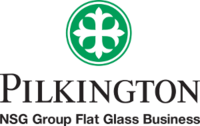Pilkington Brothers
 |
|
| Subsidiary | |
| Industry | Glassmaking |
| Founded | 1826 (St Helens) |
| Headquarters | St Helens, United Kingdom |
|
Number of locations
|
Germany is now central organisational hub |
| Products | Glass |
| Parent | NSG Group |
| Website | pilkington.com |
Pilkington Group Limited is a multinational glass manufacturing company headquartered in St Helens, United Kingdom and a wholly owned subsidiary of the Japan-based NSG Group. Prior to its acquisition by NSG in 2006 it was an independent company listed on the and for a time was a constituent of the FTSE 100 Index.
The company was founded in 1826 as a partnership between members of the Pilkington and Greenall families, based in St Helens, Lancashire. The venture used the trading name of St Helens Crown Glass Company. On the departure from the partnership of the last Greenall in 1845, the firm became known as Pilkington Brothers. In July 1894 the business was incorporated under the Companies Act 1862 as Pilkington Brothers Limited.
Pilkington was floated as a public company on the in 1970. It was for many years the biggest employer in the northwest industrial town. The distinctive blue-glass head office tower-block on Alexandra Business Park, off Prescot Road, used as the firm's world HQ, and completed in 1964, still dominates the town's skyline.
Between 1953 and 1957, (Sir) Alastair Pilkington and Kenneth Bickerstaff invented the Float Glass Process, a revolutionary method of high quality flat glass production by floating molten glass over a bath of molten tin, avoiding the costly need to grind and polish plate glass to make it clear. Pilkington then allowed the Float Process to be used under licence by numerous manufacturers around the world.
Pilkington, with its subsidiary Triplex Safety Glass, in which it gradually acquired a controlling interest, also became a major world supplier of toughened and laminated safety glass to the automotive, aerospace and building industries.
During the 1960s and 1970s, Pilkington used the flow of Float royalties to invest in float glass plants in several countries including Argentina, Australia, Canada and Sweden; also to acquire major existing flat and safety glass producers and plants in USA (Libbey Owens Ford), Germany and elsewhere. A Monopolies Commission report in 1967 concluded that Pilkington and Triplex operations were efficient and entrepreneurial and, despite their high share of the UK glass trade, operated in a manner suited to consumers' best interests.
...
Wikipedia
